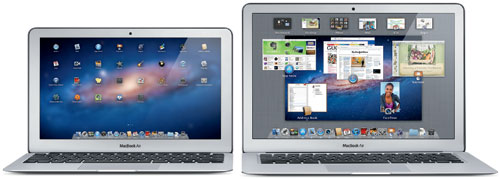Hosted by site sponsor WebMate.
MacBook Air Q&A
Published June 29, 2012
All Mac Q&As >> MacBook Air Q&A (Home) | Also See: All MacBook Air Specs
To be notified of new Q&As, sign up for EveryMac.com's bimonthly email list.
How fast are the "Mid-2012" MacBook Air models compared to one another and to earlier MacBook Air models? How fast are these models compared to the 13-Inch "Mid-2012" MacBook Pro?
Please note that all Mac notebooks mentioned in this Q&A have been discontinued. However, it is up-to-date and remains quite useful for anyone considering any of these models on the used market.
In the official company press release for the stock "Mid-2012" MacBook Air line -- the MacBook Air "Core i5" 1.7 11-Inch and MacBook Air "Core i5" 1.8 13-Inch -- Apple remarks that these models have the "latest processors" and that the "integrated Intel HD Graphics 4000 is up to 60% faster" than the Intel HD Graphics 3000 used by the previous "Mid-2011" MacBook Air models.

Photo Credit: Apple, Inc. (Left - 11" MacBook Air, Right - 13" MacBook Air)
With the marketing angled in this manner, one would expect the overall performance difference between the "Mid-2012" and "Mid-2011" models to be more modest than the graphics performance. Nevertheless, with a more advanced "Ivy Bridge" architecture, it still would be reasonable to expect a notable difference.
To determine exactly how notable, though, and to compare the "Mid-2012" models to one another as well as the entry-level MacBook Pro requires benchmarks and real-world testing.
General Performance Overview
For a solid general overview of the performance differences between the "Mid-2012" MacBook Air models and earlier models as well as other Macs, EveryMac.com's own Ultimate Mac Comparison makes it quick to compare side-by-side 32-bit and 64-bit Geekbench benchmark averages with all other G3 and later Macs for thousands of possible performance comparisons.
The Geekbench benchmark shows that the stock MacBook Air "Core i5" 1.7 11-Inch (Mid-2012) is roughly 6% slower than its larger counterpart, the MacBook Air "Core i5" 1.8 13-Inch (Mid-2012).
It also demonstrates that the "Mid-2012" 11-Inch and 13-Inch models are roughly 27% and 16% faster overall than the standard MacBook Air "Core i5" 1.6 11-Inch (Mid-2011) and "Core i5" 1.7 13-Inch (Mid-2011) replaced, respectively.
Likewise, Geekbench shows that the standard 13-Inch "Mid-2012" MacBook Air model is in the neighborhood of 8% and 20% slower than the standard 13-Inch "Mid-2012" MacBook Pro models -- the MacBook Pro "Core i5" 2.5 13-Inch (Mid-2012) and "Core i7" 2.9 13-Inch (Mid-2012).
Other Benchmarks & Real-World Test Results
Geekbench provides a convenient overview of overall performance, but a variety of other benchmarks and real-world tests also can be worthwhile for a well-rounded viewpoint.
The industry-standard MacWorld ran an assortment of benchmarks and application tests on both the 11-Inch and 13-Inch models and reported:
The new Airs are roughly 15 to 21 percent faster in processor-intensive tasks (namely, our Cinebench CPU and MathematicaMark8 tests) than their immediate predecessors, and that’s the case for both the 13-inch and 11-inch models. . .
In our [graphics] testing the 2012 Airs were indeed around 60 percent faster in our Cinebench OpenGL test, though only 20 to 25 percent faster in our Portal test. So while Apple's claims may not hold up across the board, it's clear that the 2012 Airs gain significant graphics improvements and comfortably best all previous generations in this area.
ArsTechnica tested the 11-Inch model with several benchmarking programs -- including Cinebench for graphics -- and found:
The change is noticeable -- between 2011 and 2012, there's at least a 50 percent increase in frame rate, and possibly more. . . whether you are upgrading from a 2010 or a 2011 MacBook Air model, buying any of the MacBook Airs from 2012 will get you a noticeable improvement in graphics.
For those who prefer video evaluations to text and charts, DetroitBorg does an excellent job of evaluating the performance of the stock 11-Inch model compared to its predecessor:
Performance Summary
Ultimately, the faster processor, architecture, graphics, RAM and storage provided by the "Mid-2012" MacBook Air models result in a system that is notably faster than the models replaced, particularly for graphics performance. However, although performance varies from test-to-test, the "Mid-2012" MacBook Air models still are slower overall than the "Mid-2012" MacBook Pro line.
In the US, site sponsor Other World Computing sells used and refurb MacBook Air models at bargain prices with free shipping, as well. On the other hand, if you need to sell a MacBook Air, A+ BBB-rated Cash for Your Mac and GoRoostr will buy your older notebook with an instant quote and prompt payment.
In the UK, site sponsor Hoxton Macs sells used MacBook Air models with a one-year warranty and free next day delivery throughout the UK. Delivery across Europe also is available starting at just £9.99 for two-day delivery to France and Germany.
Also see: How much faster are the custom processor configured "Mid-2012" MacBook Air models than the stock models? Is the extra performance worth the extra cost?
Permalink | Report an Error/Typo | Sign Up for Site Update Notices
Established in 1996, EveryMac.com has been created by experts with decades of experience with Apple hardware. EveryMac.com includes, and always has included, original research incorporating detailed, hands-on inspection of packaging, computers, and devices as well as extensive real-world use. All information is provided in good faith, but no website or person is perfect. Accordingly, EveryMac.com is provided "as is" without warranty of any kind whatsoever. EveryMac.com, and the authors thereof, shall not be held responsible or liable, under any circumstances, for any damages resulting from the use or inability to use the information within. For complete disclaimer and copyright information please read and understand the Terms of Use and the Privacy Policy before using EveryMac.com. Copying, scraping, or use of any content without expressed permission is not allowed, although links to any page are welcomed and appreciated.
